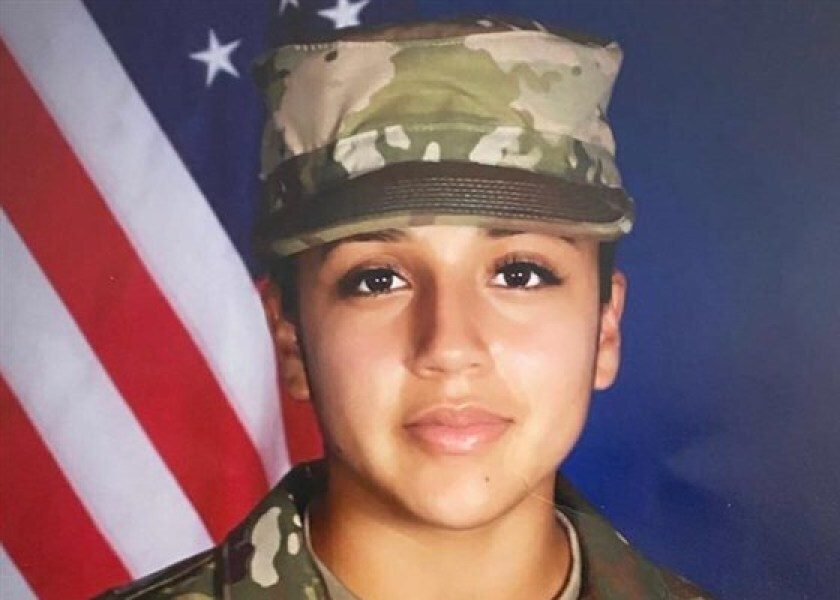The Air Force has more to do to lead by example, and to create a culture where people feel comfortable discussing sexual assault and other forms of violence with their superiors, service leadership said.
The death of Army Spc. Vanessa Guillén, a 20-year-old Soldier who disappeared from Fort Hood, Texas, in April, has reverberated across the Pentagon. FBI and court records show that Guillén was allegedly dismembered and buried in the woods by another Soldier and his girlfriend, according to Task and Purpose. A motive is still unknown, though the 3rd Cavalry Regiment launched an investigation into claims that Guillén was sexually harassed before her death.
“Empowering leaders at every level to be able to help create a culture and a climate where Airmen are willing to talk and share what is going on in their lives, maybe that would have helped the Vanessa Guillén situation,” Chief Master Sergeant of the Air Force JoAnne S. Bass said at the Air Force Association’s virtual Air, Space & Cyber Conference.
Bass said leaders should be empowered to elevate concerns about interpersonal violence to get them heard. In cases where someone’s direct boss is causing a problem, she said, Airmen should feel able to talk to other superiors or offices that can help.
“We can do better [at] providing them the tools to handle some of these very, very challenging [issues]—whether it be COVID, violence, sexual assault, racial disparity, all these are things that our young people are having to deal with in leadership roles,” Air Force Chief of Staff Gen. Charles Q. Brown Jr. said. “There’s some things we need to talk about [in] leadership development that we can improve upon.”
While Guillén has become the face of the military’s own #MeToo movement, the Pentagon as a whole has not yet found a solution to curb sexual assault in its ranks.
More than 60 percent of all investigated sexual assault and harassment cases across DOD in 2019 happened between service members, according to the department’s latest annual Report on Sexual Assault in the Military. More than 7,800 sexual assault cases were reported in the department in fiscal 2019, a 3 percent increase. The Air Force accounted for 1,683 of those, a 9 percent jump.
Guillén’s story echoes across each of the armed forces. Airman 1st Class Natasha Aposhian was killed at Grand Forks Air Force Base, N.D., in June, in what her parents believe was a domestic violence incident with another Airman. Aposhian “told [Airman 1st Class Julian Carlos Torres] the day prior to her killing that she did not want to date him any longer,” her family told Stars and Stripes. Torres died in the incident as well.
Guillén’s death and the outcry it prompted from people with similar experiences spurred the Department of the Air Force to create an Interpersonal Violence Task Force in July. This month, the department is surveying service members on their experiences with sexual assault and other forms of violence as it looks for solutions.
“Those events highlighted inexcusable violence against our service members by fellow service members,” Air Force spokeswoman Maj. Holly Hess said. “Department of the Air Force leaders acknowledged there were concerns from Airmen and space professionals about violence, stalking, bullying, and threatening behaviors in both the Air Force and Space Force. In response to those concerns, the Interpersonal Violence Task Force was created.”
The task force will use feedback from the survey to shape recommendations for future policy changes.
Congress is taking another look at the problem as well. The U.S. House of Representatives will vote on a bipartisan bill named after Guillén that aims to reform how military sexual assaults and harassment are reported.
Rep. Jackie Speier (D-Calif.), head of the House Armed Services military personnel subcommittee, and Rep. Markwayne Mullin (R-Okla.) introduced the “I Am Vanessa Guillén Act” with more than 100 co-sponsors on Sept. 16.
“The legislation responds to these resounding calls for change by offering provisions that would revolutionize the military’s response to missing service members and reports of sexual harassment and sexual assault by making sexual harassment a crime within the Uniform Code of Military Justice, and moving prosecution decisions of sexual assault and sexual harassment cases out of the chain of command,” Speier’s office said in a press release.
Their bill would instead shift prosecution decisions to an Office of the Chief Prosecutor within each military service, hoping to avoid situations where commanders stifle assault or harassment claims or where superiors are handling cases in which they are accused.
Military personnel would be able to file negligence claims and seek compensation from the Defense Department for sexual assault or harassment cases.
Also, the bill calls for a Government Accountability Office investigation into how the military handles missing service members, and a GAO evaluation of the armed forces’ Sexual Harassment/Assault Response and Prevention programs. A new, confidential harassment reporting process would feed into the Pentagon’s “Catch a Serial Offender” database.
Sens. Mazie K. Hirono (D-Hawaii) and Cory Booker (D-N.J.) introduced companion legislation in the Senate.
